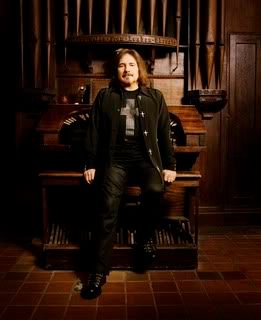BLACK SABBATH - Geezer Butler On Paranoid, Being "Very Close" To RONNIE JAMES DIO, Possibilities Of Reunion With OZZY
September 3, 2010, 14 years ago
By "Metal" Tim Henderson
It's kinda like a newborn. Kid pops out and you've got a ton of memories ... that's if you take a bunch of photos, videos, mental notes at the time. These days, the ease of technology is in your favour. In 1970, it was another story. And when this child popped out, all of its youthful parents were in a hard rock n' roll haze. The kid's name was Paranoid and the parents were called BLACK SABBATH. That offspring has turned 40 and now everyone wants to know when it walked, talked and shone it's first pearly white. Ask singer Ozzy Osbourne, drummer Bill Ward, guitarist Tony Iommi and bassist Geezer Butler about those very early days and it's a blur. More so when the media was shitting on you and the only saviours were the fans who bought the album in droves, especially the title track that is still today an encore staple for both the Sabs and Ozzy's solo career.
I'm not calling bassist Geezer Butler an (ahem) old geezer, but he's only human. And he's been talking this anniversary up lately to the point that he's sick to death of Paranoid questions. "You could say that," the four-string legend agrees!
It's an understatement that Paranoid changed the face of music. Not just heavy metal. The term meant nothing in the early '70s. And as Butler explains, it wasn't until METALLICA, SLAYER, MEGADETH, FAITH NO MORE and PANTERA among numerous others started to talk about the band in the '90s that the Sabbath name finally gained the respect it deserved.
But back to Paranoid ... an album that was more than simply a radio-friendly title track. It was the down-tuned majesty, the spitting anti-war lyrics, the ultimate black mass. It wasn't about witch burnings or Satanic fodder, it was much more serious. It had the tone, the riff, the primal beats and the voice. The spawn of four innocent Birmingham youths that unknowingly would change the face of the heavy music world forever. As mentioned, at the time it was the critics dream to flush such works down the toilet. The album did manage to hit number one in the UK and in the US it landed in the top 20, allowing the Sabs to leave their depressing steel-town surroundings and tear a strip off North America. Today, Paranoid is regarded by many as the greatest heavy metal album of all time.
It's now part of the treasured Eagle Rock Entertainment series Classic Albums: Black Sabbath – Paranoid, which features commentary from all members of the band recalling their crowning achievement.
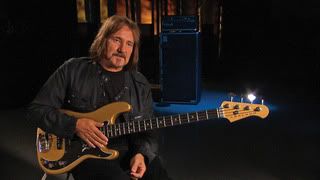
In 1970, Iommi, Osbourne and Ward were 22, Butler was just 21. Certainly the band couldn't fathom the effect 'War Pigs', 'Paranoid', 'Planet Caravan', 'Iron Man', 'Electric Funeral', 'Hand Of Doom', 'Rat Salad' and 'Fairies Wear Boots' would have on the world once the album was pressed.
"It’s really strange because at the time the critics didn’t give us any encouragement whatsoever and we were sort of on the outside of other bands," Butler explains. "We didn’t really mix a lot with other bands, and it wasn’t really until bands like ANTHRAX and Metallica started saying that we influenced their music that I sort of gave it a second thought. The critics completely missed the whole point of the band. I mean, back then the critics they used to write in the English papers, they’d be covering like THE ARCHIES and stuff like all these pop bands and everything, and then they’d listen to our music and of course it wouldn’t sound anything like what they were used to writing about. You didn’t have the sort of metal writers that now understand what you do. It was on the first album because we didn’t think it was going to sell anything anyway, so it was a bit discouraging when we read the first reviews of the album. But then a couple weeks after that it went into the charts so we didn’t really care after that."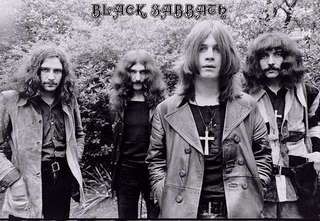
When listening to it, do you hear mistakes? Anything that you’d like to go back and change, or is it just this pillar?
"No, I wouldn’t want to change it," Butler counters, "but there are mistakes because we played it as if it was a live gig, and because we’d never heard ourselves back then because there was no tape records or anything, we couldn’t afford them anyway. So you only heard what you did when you were onstage, so some notes I may have got wrong on the bass, but it’s all part of the sound of the album, it’s like that unpolished, raw sound. We were just doing music that we liked writing together. We never thought about it as heavy metal or anything like that. We just thought it was rock, heavy rock kind of thing. We all loved HENDRIX and CREAM and JOHN MAYALL, that kind of heavy kind of other bands, ZEPPELIN. And so that was the natural sort of progression when we started writing our own stuff."But you must be sick of performing these songs live, or do you feed off the audience?
'It’s great to see the audience reaction," the bassist agrees. "I mean, the last time I played anything from Paranoid is five or six years ago now, so when you leave it that long it’s nice to revisit them and it’s great to get that audience reaction when you do do ‘em live."
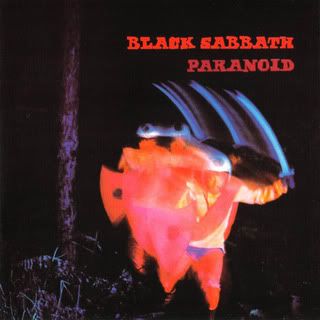
Despite the ripple effect Paranoid had at the time, Butler is surprised the foursome lasted as long as it did. "Bands lasted like two or three years and then you wouldn’t hear from them again. When we did Paranoid, THE BEATLES had only been together for eight years and broken up. So we thought, 'well if the Beatles break up after eight years then we’ll probably last about two or three years and that’ll be it. And never to be heard of again,' which is a good thing because if you could get a time machine you probably would go back and change the music so it’s perfect and everything, and it just wouldn’t be the same."
Butler says that it's all about a belief in your music that kept the drive alive.
"Our families had sort of thrown us out ‘cause we wouldn’t get proper jobs, so they didn’t believe in it. The friends I had thought I was nuts. They just didn’t have the - I don’t know what it was, ambition’s the wrong word. I suppose the belief in the music and we just wanted to do the music more than anything else on earth and luckily it turned out well for us."The British scene at the time was a boiling pot for some of the greatest bands in the heavy rock/acid rock scene which including fellow countrymen DEEP PURPLE, JUDAS PRIEST, URIAH HEEP, BAD COMPANY and the aforementioned Zeppelin for example.
"I think one of the biggest influences was Zeppelin because two of them were from the same part of England that we were from, from Birmingham, and we used to see them in clubs and stuff around town. So we sort of associated more with Robert Plant and John Bonham than anybody else, I suppose, ‘cause we were doing the same kind of circuit before we made it."Did you have a relationship with these guys, was there any kind of competition?
"No, there wasn’t competition, just friends. We’d see each other out and have a beer or whatever, and just socially really."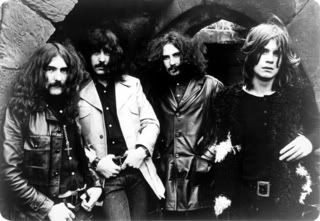
So what did your musical peers think at the time, when you released Paranoid.
"We didn’t really hear from anybody," Butler recalls, "because everybody seemed to be doing their own kind of thing. There was like lots of new kinds of music coming out around, and everybody sort of had their own originality."Paranoid struck a chord at home first before the rest of the world fell to the Sabbath spell. The North American release of Paranoid was actually held until January 1971, as the Black Sabbath album was still on the charts at the time of Paranoid's UK release.
"America was always like the goal that everybody sort of wanted to get into," Butler remembers fondly. "When I was growing up, I always heard about FRANK SINATRA, ELVIS and all these people, and you’d watch films that were always based in America, all the big films and everything. It was sort of like a totally different planet, so you always wanted to go there, even regardless of being in a music band. You just wanted to go to America to see it ‘cause you’d heard so much about it and grown up with all these icons. And so it was really exciting for us to be able to come over and play, yeah."Do you remember the first musician from America that you met when you were on the road?
"I think it probably was MOUNTAIN, because we went out and supported them. Leslie West's band."There are so many rumours about the album cover and the title that was originally set at War Pigs but record label bullying switched it to Paranoid fearing backlash from supporters of the Vietnam War that ran until 1975. The 40 year-plus image of a bearded man with a sword and shield jumping out from behind a tree has been overlooked - it’s so bad it’s good now. So who is this guy wielding the weapon?
"I have no idea," he laughs. "I mean we didn’t have any say whatsoever in album artwork or even the title of the album. We wanted to call it War Pigs and the record company wanted to call it Paranoid, so they were right I suppose. They just went ahead and did everything up and we saw the finished thing like about a week before it came out. They gave us one album each. That’s all we had. And that was the first time we’d heard it since it’d been mixed. We weren’t allowed on the mixing sessions or anything, so that’s the first time we’d actually heard it. After that we had a bit more power. We sort of knew what we were doing in the studio and spent a bit more time in the studio, and with the packaging and everything else."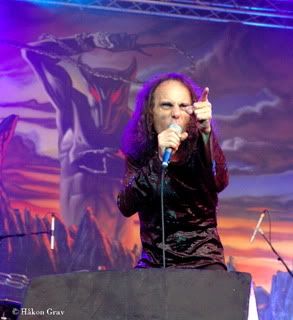
We change the tune to the terrible tragedy that befell the music community in the early hours of May 16th of this year when RONNIE JAMES DIO passed away from metastasized stomach cancer. A massive blow to metalheads worldwide, to bring up the topic nearly four months later, both myself and Butler are overcome with a cloud of emotion as he not only lost a band-mate, but a true friend that he could depend on. Butler and his wife Gloria were also tight with Ronnie and his wife/manager Wendy.
"Yeah, we were very close."What do you miss right now when you think about Ronnie?
"Just his whole presence," Butler responds in a sombre tone. "I mean, he could always talk about anything. It’s very rare that I find other people that can talk about absolutely anything from books to any sport, TV, films, whatever. And he’d always have an interesting point of view. And musically as well, you know, and Ronnie wasn’t afraid to disagree with you. And I like arguing with people as well as he did, so we could always have good arguments together and just great conversations. He didn’t live that far away from me here so I used to be able to call him up and we’d go down to the pub and have a pint or whatever, and I can’t do that anymore so it’s like you lose not only the person you work with but one of your best friends. It’s really hard to take. We used to talk about a lot of soccer. I love soccer and he used to keep up with that and we’d talk about that for ages. And he loved baseball, so I know enough about that to talk to him about that. Just the usual friend things, you know? It is really hard to find somebody like that."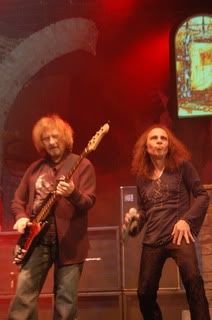
Butler and his HEAVEN & HELL band-mates Tony Iommi and Vinny Appice performed a special tribute to Dio on Saturday, July 24th at the High Voltage festival at Victoria Park in London, UK. The threesome were joined by Jorn Lande (MASTERPLAN) and Glenn Hughes (ex-Deep Purple, Black Sabbath) who covered the vocals on the special tribute set-list.
About the celebration of Dio's music, Butler says that "it was something that we were asked to do and all the money was going to Ronnie’s charity (Ronnie James Dio Stand Up And Shout Cancer Fund). It was a good start for his charity, good publicity for it. And so we did it more for that than anything else. So it was sort of a closure in one way but not in another. It was a sort of closure musically but not personally. And it was very strange getting up on stage and Ronnie wasn’t there. I don’t think it really hit home until we actually walked out on stage. And it wasn’t Ronnie."
I’m sure the fans helped you pull through.
"Oh, yeah, the fans have been incredible. I mean, Ronnie’s fans have got to be some of the best on earth. It’s been great, there’s been no cynicism like you sometimes get. It’s all been very positive.There’s talk that there might be another gig in Los Angeles next year?
"Yeah, I think that’s all down to Wendy," Butler responds. "I think it’s more on the Dio side of it than the Sabbath/Heaven & Hell kind of thing."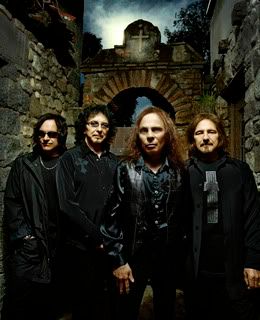
Our conversation moves into obvious territory given the rumours that the original members of Black Sabbath may be having one more kick at the can. Butler adds his two cents.
"I’ve always said I’d like to, even when Heaven & Hell was going, I’d love to one day with the original line-up do places like Japan and Australia and Eastern Europe that weren’t available the first time around. We’ve never played Japan, we haven’t played Australia since the ‘70s, never played Russia and Czechoslovakia - well Slovakia - and all those kind of places. So it’d be nice to do that for a final, one-off Sabbath tour. As well as the rest of the world. Surprisingly lots of places have opened up now. And it’s just that before I kick the bucket (both laugh) I’d like to do one final. I mean, it’d be nice to do one final tour with the original line-up in those places like Singapore and places like that. Just so many places now to play. It’d probably take ten years. I mean it’s amazing like a lot of the communist countries, the big thing was heavy metal. Iran and places like that have asked us to play there. We can’t do that, but there’s a big metal underground in these places. Really weird."I mention my time spent with Ozzy recently at the the Scream launch when the Prince Of Darkness just blurted out: “I’ll say one thing about great bands. There’s only one band to play Black Sabbath stuff: Tony Iommi, Bill Ward, Geezer Butler, and myself."
I asked Ozzy: “Is there any future to that remark?” And he responded: “I never say never.”
"That’s what I’m saying," Butler reacts. "It’d be nice to do these things, but whether it’ll ever happen or not; you know we’re all gettin’ on now. Time doesn’t wait for anyone, as the old saying goes, but if it’s gonna happen it’ll have to happen soon."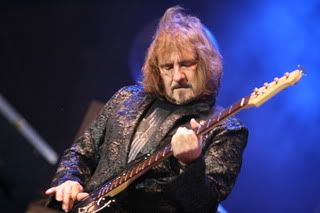
Following the death of Dio, Butler says that his own musical output under the G/Z/R monicker has come to a virtual stand-still.
"Because of the Ronnie thing I haven’t really done anything musically this year because my friend going through chemotherapy, which isn’t a great thing to have to watch, so music hasn’t played a great part in me life this year. But I’m starting to get back into it now, starting to write some new riffs and stuff. Wherever that will go, I don’t know. It has been probably the toughest year of me life so far."Our conversation closes with the sentiment that music heals and Butler's output with Sabbath has been the ultimate saviour to us fans.
"Absolutely," he agrees. "And when you hear feedback like that from you, that’s what keeps you going."